Coping with grief
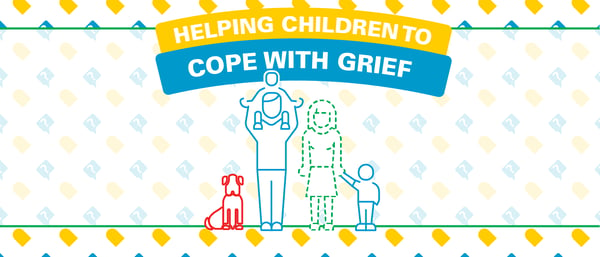
Helping children to cope with grief
Losing someone close to us is always going to be a traumatic event in our lives, but for children their reaction can be more complex and unpredictable. Younger children may have no understanding of what’s happened or context for how they should react. For older children it’s likely to be the first time they’ve experienced these feelings and are working out how to express them.
In all cases, no matter how much we may want to protect our children, there’s nothing we can do about the fact that one day they will face the loss of a loved one. What we can do about it is prepare them for the experience and help them to grieve.
We interviewed a grief expert and surveyed 1,000 parents of 3-16-year-olds to find out how we can help children come to terms with the loss of a loved one and its aftermath.
Helping children to cope with grief
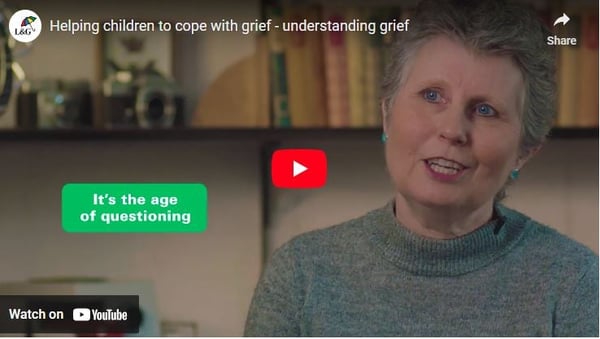
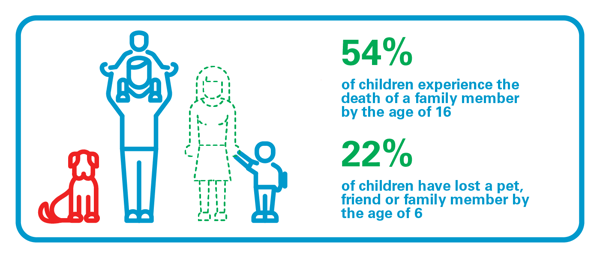
What do children understand about death?
A child’s grasp of the concept of death will evolve as they get older.
Before the age of 5, most children won’t understand that death is permanent, and that those who die won’t return.
“Preschool children may have a rudimentary understanding of what death is and its implications but will not fully understand its irreversibility and universality.
“Children begin to have a more complete understanding of death by the age of 8 or 9, realising that it is final, permanent, universal and an unavoidable part of life.
“Adolescents who are already managing the struggles of increasing independence and identity may turn to peers rather to family members for support. At this age they are becoming aware of the big issues of life, death, and the meaning of life, and the death of someone significant can feel very shocking.”
Dr. Katie Koehler, Deputy Director of Bereavement Support and Education, Child Bereavement UK
Children’s beliefs about death
Children’s ideas about what happens to someone after they die tend to change as they get older. There’s a marked decline in more supernatural beliefs, though nearly half of 11-16-year-olds still believe the dead go to heaven. This doesn’t seem to be a simple reflection of parental beliefs, as only 29% of parents surveyed believed in an afterlife.
Older children are also slightly more likely to see things more in terms of physical reality, with 54% of 11-16-year-olds believing that a person who dies is not in pain any more, compared with 36% of 3-6-year-olds.
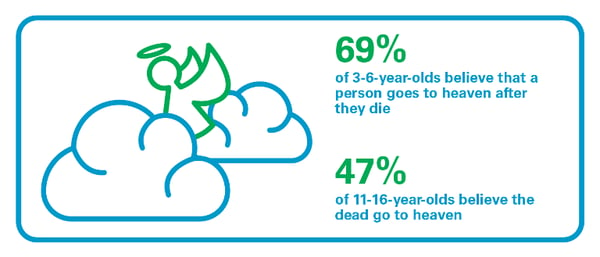
Encouraging curiosity
Children are likely to first approach the idea of death by asking questions. 43% of parents whose child had lost someone close while still young, said their child became noticeably more inquisitive while grieving.
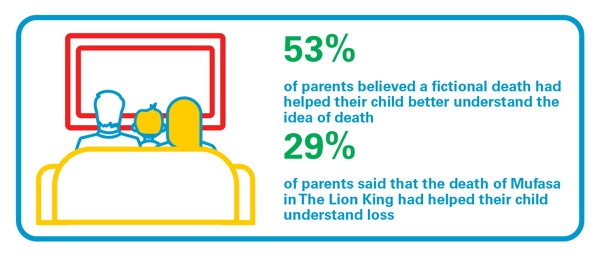
How do children learn about death?
There seem to be two key ways that children are most likely to first come across the idea of death:
- The death of a fictional character
- The death of a pet
“Children need to have a coherent narrative of what has happened at a level appropriate to their age and understanding to enable them to ask any questions without feeling the subject is prohibited.”
Dr. Katie Koehler, Deputy Director of Bereavement Support and Education, Child Bereavement UK
The death of a fictional character
The death of characters in films, books and television shows is often where children first encounter the idea of loss. And it’s no wonder, as research suggests that characters in children’s films are twice as likely to lose their life than in films made for grown-ups. Think of Dobby and Dumbledore in Harry Potter and Mufasa in The Lion King, for example. Not that this is a bad thing – many parents believed it would make their child better adjusted to cope with grief as they grew up.
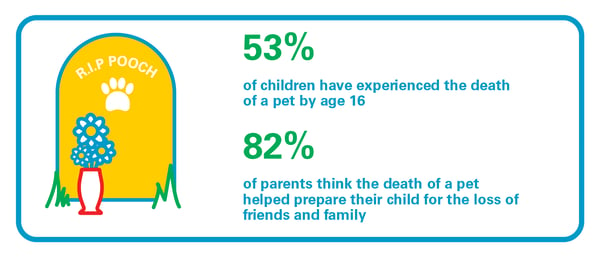
The death of a pet
Parents also believe that, as well as teaching them about responsibility and being affectionate, owning a pet helps children to learn to cope with grief when it dies.
45% of parents also took the opportunity to give their children experience of saying goodbye to a loved one by holding a pet funeral.
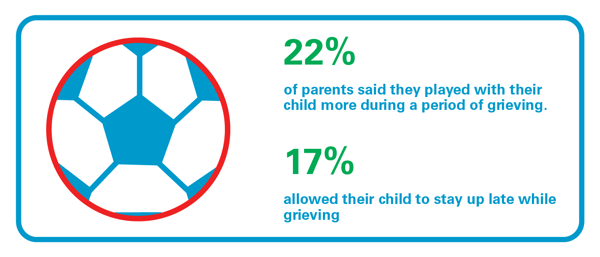
Helping children cope after the death of someone close
Grief affects children in different ways, just as it does adults. Some young children may start to withdraw into themselves – 16% of parents said they noticed their child becoming less talkative at these times.
How to cope with this? Quite often, parents fine the best course of action is to find positive experiences to provide a counter-balance and give their child the time and space they need.
“If adults are able to give children the information they need, have the capacity to understand what the child might be thinking and feeling and provide the opportunity for the child to ask questions and to express themselves, it will go a long way to giving them what they need.”
Dr. Katie Koehler, Deputy Director of Bereavement Support and Education, Child Bereavement UK
Spending quality time together
A child can feel lonely and isolated after the death of someone close, while trying to deal with feelings and concepts entirely new to them. Spending quality time with them by letting them stay up late or taking them on days out can help a child feel loved and secure. And it can also allow the parent space to find comfort and grieve themselves.
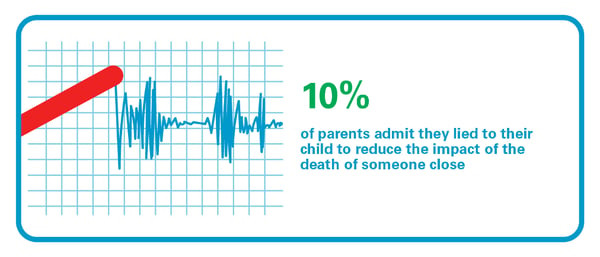
Answering their questions honestly
Parents can still sometimes find it difficult to address the subject of death head on with children and may be tempted to avoid the issue or even lie to young children when someone close passes away. This is not the best idea, and ultimately honesty and openness are always the way to go when responding to a child’s naturally inquisitive nature.
“Adults’ desire to protect children can have an unwanted counterproductive effect. Children will tend to make up what they don’t know. Their imaginings of the situation can often be worse than the reality.”
Dr. Katie Koehler, Deputy Director of Bereavement Support and Education, Child Bereavement UK
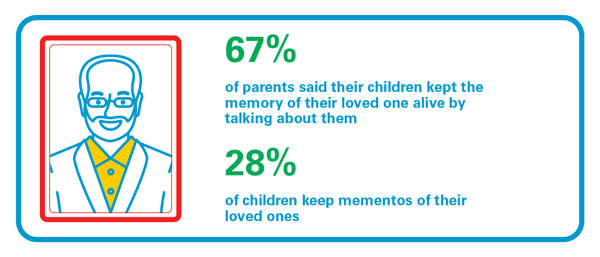
Allow memories to live on
Even after someone close has died it’s still possible to keep them alive in our memories. It’s important that children should be aware that getting through a period of grieving doesn’t mean that you have to forget the person. They can keep their memory alive by talking about them as well as in physical objects like photos. And visits to the grave, marking the anniversary of the death or celebrating their birthday can all help with the grieving process.
“Another challenge is the view that there is a time period for grief and that children should be ‘over it’ in a particular time frame. Grief is something we continue to manage throughout life.”
Dr. Katie Koehler, Deputy Director of Bereavement Support and Education, Child Bereavement UK
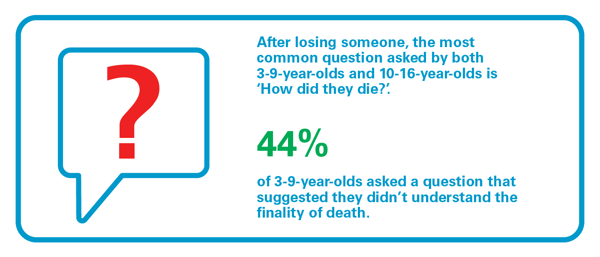
If you would like to find out more about how 3-16-year-olds understand and cope with the death of people and pets, take a look at our Lessons on Life and Loss guide.